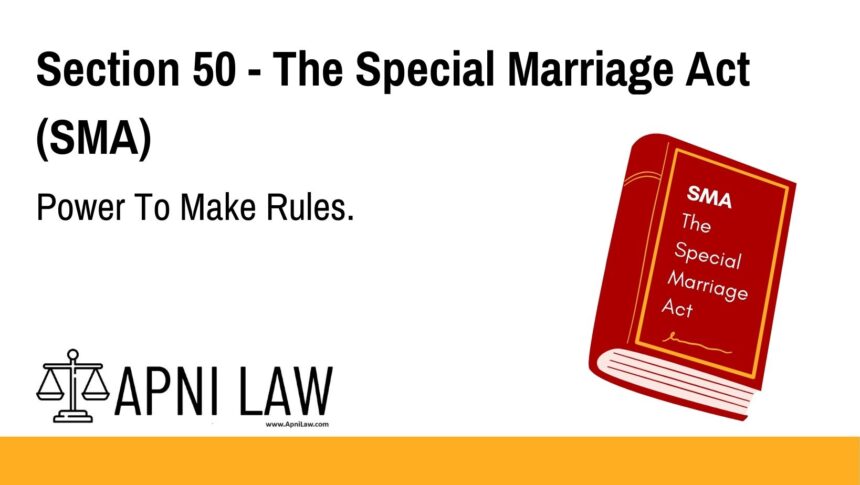Code: Section 50 – Power to Make Rules
(1) The Central Government, in the case of officers of the Central Government, and the State Government, in all other cases, may, by notification in the Official Gazette, make rules for carrying out the purposes of this Act.
(2) In particular, and without prejudice to the generality of the foregoing power, such rules may provide for all or any of the following matters, namely:
(a) the duties and powers of Marriage Officers and the areas in which they may exercise jurisdiction;
(b) the manner in which a Marriage Officer may hold inquiries under this Act and the procedure therefor;
(c) the form and manner in which any books required by or under this Act shall be maintained;
(d) the fees that may be levied for the performance of any duty imposed upon a Marriage Officer under this Act;
(e) the manner in which public notice shall be given under section 16;
(f) the form in which, and the intervals within which, copies of entries in the Marriage Certificate Book shall be sent in pursuance of section 48;
(g) any other matter which may be or requires to be prescribed.
(3) Every rule made by the Central Government under this Act shall be laid, as soon as may be after it is made, before each House of Parliament, while it is in session, for a total period of thirty days which may be comprised in one session or in two or more successive sessions, and if, before the expiry of the session immediately following the session or the successive sessions aforesaid, both Houses agree in making any modification in the rule or both Houses agree that the rule should not be made, the rule shall thereafter have effect only in such modified form or be of no effect, as the case may be; so, however, that any such modification or annulment shall be without prejudice to the validity of anything previously done under that rule.
(4) Every rule made by the State Government under this Act shall be laid, as soon as it is made before the State Legislature.
Explanation of Section 50 – Power to Make Rules
Section 50 of the Special Marriage Act, 1954 empowers both the Central and State Governments to frame rules necessary for implementing and administering the Act effectively. The distinction in authority lies in the governing body responsible—Central Government rules apply to central officers, while State Governments can frame rules for all other cases within their jurisdiction.
Key Takeaways:
- Both Central and State Governments have the authority to frame procedural and administrative rules via notifications in the Official Gazette.
- Rules can cover areas such as:
- Jurisdiction and duties of Marriage Officers
- Inquiry procedures
- Record maintenance formats
- Fee structures
- Manner of public notice (as per Section 16)
- Reporting procedures for marriage entries (as per Section 48)
- Rules framed by the Central Government must be placed before both Houses of Parliament.
- State Government rules must be laid before the respective State Legislatures.
This provision provides a structured mechanism to ensure the operational efficiency and adaptability of the Special Marriage Act across different administrative units in India.
Illustration
Example 1: Rule Framed by State Government for Fees
A State Government may issue a notification specifying that a fee of ₹100 shall be charged by a Marriage Officer for the registration of marriage. This rule, once notified and laid before the State Legislature, becomes enforceable within that state.
Example 2: Central Government Rule on Record Keeping
The Central Government may prescribe a uniform digital format for the Marriage Certificate Book for all Central Government Marriage Officers. This ensures consistency and data integrity in national records.
Common Questions and Answers on Section 50 SMA
1. Who has the authority to make rules under Section 50?
Both the Central and State Governments can make rules. The Central Government governs rules related to central officers, while State Governments handle all other cases.
2. What kind of matters can be covered under these rules?
Matters include the powers and duties of Marriage Officers, inquiry procedures, fees, record-keeping formats, and public notice processes, among others.
3. Are these rules subject to legislative oversight?
Yes. Central Government rules must be presented before both Houses of Parliament. State Government rules must be laid before the respective State Legislature.
4. Can rules be modified after they are made?
Yes. Parliament or State Legislatures may modify or annul the rules, but actions taken under the rules before modification remain valid.
5. What ensures that the rules are made public?
Rules are published in the Official Gazette, ensuring transparency and public access.
Conclusion
Section 50 of the Special Marriage Act, 1954 ensures that the practical implementation of the Act is supported by detailed and localized rules. By empowering both Central and State Governments, the provision ensures flexibility, administrative efficiency, and procedural clarity across the country.
For detailed insights into Indian marriage laws and procedural rules, visit ApniLaw for expert legal content and updates.








